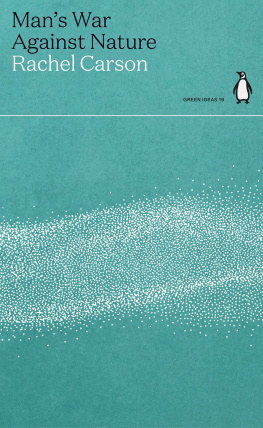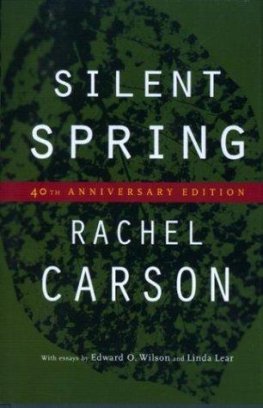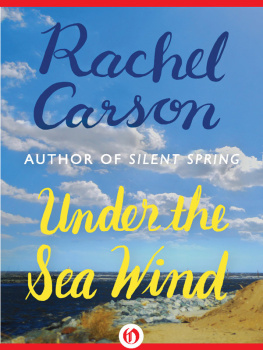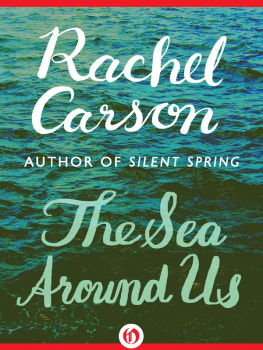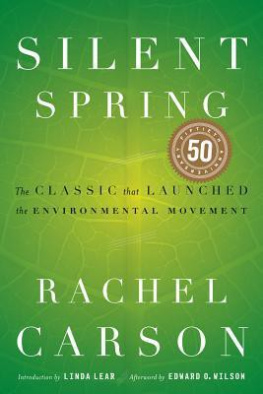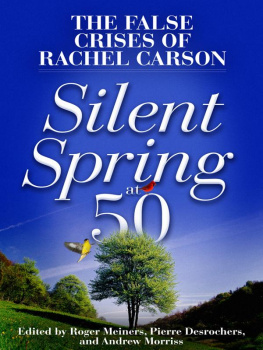- Greta Thunberg No One Is Too Small to Make a Difference
- Naomi Klein Hot Money
- Timothy Morton All Art is Ecological
- George Monbiot This Cant Be Happening
- Bill McKibben An Idea Can Go Extinct
- Amitav Ghosh Uncanny and Improbable Events
- Tim Flannery A Warning from the Golden Toad
- Terry Tempest Williams The Clan of One-Breasted Women
- Michael Pollan Food Rules
- Robin Wall Kimmerer The Democracy of Species
- Dai Qing The Most Dammed Country in the World
- Wangari Maathai The World We Once Lived In
- Jared Diamond The Last Tree on Easter Island
- Wendell Berry What I Stand for Is What I Stand On
- Edward O. Wilson Every Species is a Masterpiece
- James Lovelock We Belong to Gaia
- Masanobu Fukuoka The Dragonfly Will Be the Messiah
- Arne Naess There is No Point of No Return
- Rachel Carson Mans War Against Nature
- Aldo Leopold Think Like a Mountain
Rachel Carson
MANS WAR AGAINST NATURE

PENGUIN BOOKS
UK | USA | Canada | Ireland | Australia
New Zealand | India | South Africa
Penguin Books is part of the Penguin Random House group of companies whose addresses can be found at global.penguinrandomhouse.com.

First published in Silent Spring 1962
This extract published in Penguin Books 2021
Copyright Rachel Carson, 1962
The moral right of the author has been asserted
Series Design by Tom Etherington
ISBN: 978-0-141-99696-7
This ebook is copyright material and must not be copied, reproduced, transferred, distributed, leased, licensed or publicly performed or used in any way except as specifically permitted in writing by the publishers, as allowed under the terms and conditions under which it was purchased or as strictly permitted by applicable copyright law. Any unauthorized distribution or use of this text may be a direct infringement of the authors and publishers rights and those responsible may be liable in law accordingly.
There was once a town in the heart of America where all life seemed to be in harmony with its surroundings. The town lay in the midst of a checkerboard of prosperous farms, with fields of grain and hillsides of orchards, where white clouds of bloom drifted above the green land. In autumn, oak and maple and birch set up a blaze of color that flamed and flickered across a backdrop of pines. Then foxes barked in the hills and deer crossed the fields, half hidden in the mists of the mornings. Along the roads, laurel, viburnum, and alder, great ferns and wild flowers delighted the travellers eye through much of the year. Even in winter, the roadsides were places of beauty, where countless birds came to feed on the berries and on the seed heads of the dried weeds rising above the snow. The countryside was, in fact, famous for the abundance and variety of its bird life, and when the flood of migrants was pouring through in spring and fall, people came from great distances to observe them. Other people came to fish streams, which flowed clear and cold out of the hills and contained shady pools where trout lay. So it had been from the days, many years ago, when the first settlers raised their houses, sank their wells, and built their barns.
Then, one spring, a strange blight crept over the area, and everything began to change. Some evil spell had settled on the community; mysterious maladies swept the flocks of chickens, and the cattle and sheep sickened and died. Everywhere was the shadow of death. The farmers told of much illness among their families. In the town, the doctors were becoming more and more puzzled by new kinds of sickness that had appeared among their patients. There had been several sudden and unexplained deaths, not only among the adults but also among the children, who would be stricken while they were at play, and would die within a few hours. And there was a strange stillness. The birds, for example where had they gone? Many people, baffled and disturbed, spoke of them. The feeding stations in the back yards were deserted. The few birds to be seen anywhere were moribund; they trembled violently and could not fly. It was a spring without voices. In the mornings, which had once throbbed with the dawn chorus of robins, catbirds, doves, jays, and wrens, and scores of other bird voices, there was now no sound; only silence lay over the fields and woods and marshes. On the farms, the hens brooded but no chicks hatched. The farmers complained that they were unable to raise any pigs; the litters were small, and the young survived only a few days. The apple trees were coming into bloom, but no bees droned among the blossoms, so there was no pollination and there would be no fruit. The roadsides were lined with brown and withered vegetation, and were silent, too, deserted by all living things. Even the streams were lifeless. Anglers no longer visited them, for all the fish had died. In the gutters under the eaves, and between the shingles of the roofs, a few patches of white granular powder could be seen; some weeks earlier this powder had been dropped, like snow, upon the roofs and the lawns, the fields and the streams. No witchcraft, no enemy action had snuffed out life in this stricken world. The people had done it themselves.
This town does not actually exist; I know of no community that has experienced all the misfortunes I describe. Yet every one of them has actually happened somewhere in the world, and many communities have already suffered a substantial number of them. A grim spectre has crept upon us almost unnoticed, and soon my imaginary town may have thousands of real counterparts. What is silencing the voices of spring in countless towns in America? I shall make an attempt to explain.
The history of life on earth is a history of the interaction of living things and their surroundings. To an overwhelming extent, the physical form and the habits of the earths vegetation and its animal life have been molded and directed by the environment. Over the whole span of earthly time, the opposite effect, in which life modifies its surroundings, has been relatively slight. It is only within the moment of time represented by the twentieth century that one species man has acquired significant power to alter the nature of his world, and it is only within the past twenty-five years that this power has achieved such magnitude that it endangers the whole earth and its life. The most alarming of all mans assaults upon the environment is the contamination of the air, earth, rivers, and seas with dangerous, and even lethal, materials. This pollution has rapidly become almost universal, and it is for the most part irrecoverable; the chain of evil it initiates, not only in the world that must support life but in living tissues, is for the most part irreversible. It is widely known that radiation has done much to change the very nature of the world, the very nature of its life; strontium 90, released into the air through nuclear explosions, comes to earth in rain or drifts down as fallout, lodges in soil, enters into the grass or corn or wheat grown there, and, in time, takes up its abode in the bones of a human being, there to remain until his death. It is less well known that many man-made chemicals act in much the same way as radiation; they lie long in the soil, and enter into living organisms, passing from one to another. Or they may travel mysteriously by underground streams, emerging to combine, through the alchemy of air and sunlight, into new forms, which kill vegetation, sicken cattle, and work unknown harm on those who drink from once pure wells. As Albert Schweitzer has said, Man can hardly even recognize the devils of his own creation. It took hundreds of millions of years to produce the life that now inhabits the earth aeons of time, in which that developing and evolving and diversifying life reached a state of adjustment to its surroundings. To be sure, the environment, rigorously shaping and directing the life it supported, contained hostile elements. Certain rocks gave out dangerous radiation; even within the light of the sun, from which all life draws its energy, there were short-wave radiations with power to injure. But given time time not in years but in millennia life adjusted, and a balance was reached. Time was the essential ingredient. Now, in the modern world, there is no time. The speed with which new hazards are created reflects the impetuous and heedless pace of man, rather than the deliberate pace of nature. Radiation is no longer merely the background radiation of rocks, the bombardment of cosmic rays, the ultraviolet of the sun, which existed before there was any life on earth; radiation is now also the unnatural creation of mans tampering with the atom. The chemicals to which life is asked to make its adjustment are no longer merely the calcium and silica and copper and the rest of the minerals washed out of the rocks and carried in rivers to the sea; they are also the synthetic creations of mans inventive mind, brewed in his laboratories and having no counterparts in nature. To adjust to these chemicals would require time on the scale that is natures; it would require not merely the years of a mans life but the life of generations. And even this would be futile, for the new chemicals come in an endless stream; almost five hundred annually find their way into actual use in the United States alone. The figure is staggering and its implications are not easily grasped: five hundred new chemicals to which the bodies of men and all other living things are required somehow to adapt each year chemicals totally outside the limits of biological experience.
Next page
